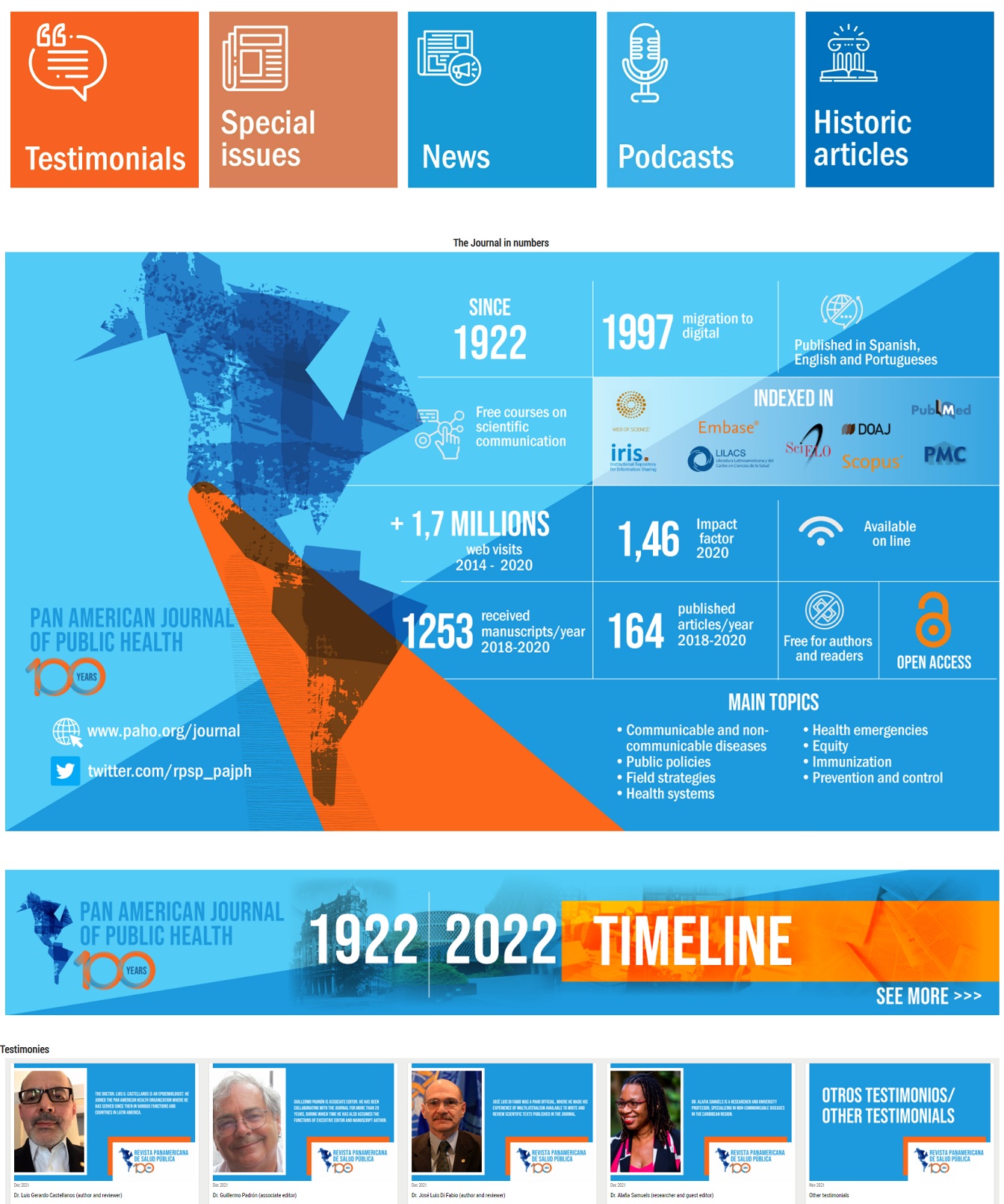Between 2021 and 2022, the Pan American Journal of Public Health will implement a series of actions to commemorate its 100 years of life, a special celebration to precede the 120th anniversary of the Pan American Health Organization and its continuous work in favor of health in the Americas. In 1902, representatives from countries of the Americas region met in Washington, D.C. for the First International Health Convention of the Republics of the Americas, marking the creation of the International Health Office, which gave rise to the Pan American Health Organization (PAHO).
Among the content offered to regional authorities in the first Boletín Panamericano de Sanidad (Pan American Health Bulletin), published in 1922, was a list of cases and deaths from contagious diseases such as cholera, bubonic plague, smallpox, exanthematic typhus, and yellow fever, which was complemented with information on treatments and prevention. This first publication highlights the vision held by the Member States of what was then called the Pan American Sanitary Bureau to create a channel for the exchange of data and scientific information that respond to the changing conditions and needs of the Region.
One hundred years later, the Pan American Journal of Public Health continues its mission of communicating key data, statistics, accurate analysis, and solutions to the countries of the Americas to help them overcome their main challenges in the field of public health. Unlike the time when the article “Differential diagnosis and removal of smallpox” (1922) was published, at present the Journal receives each year more than 1500 studies sent spontaneously by authors from different parts of the world in English, Spanish, and Portuguese, ranging from assessments of preventable deaths in children to the consequences of false information released during the COVID-19 pandemic.
The Pan American Journal of Public Health evolved with the times. Gone are its printed editions, and today a reader from any part of the world can access online and free of charge special issues such as “Infodemiology“, or articles such as this call to action against climate change, published together with prestigious international journals such as Lancet, British Medical Journal, and New England Journal of Medicine.
 The more than 150 articles published each year – selected from more than 1,500 manuscripts received annually – reflect the latest research on the most relevant regional public health issues. The doubling of the Impact Factor during 2020 and the more than 150,000 visits that the website receives each month show the readers’ interest. During the pandemic, the Journal has prioritized articles related to COVID-19 in order to support the health response and all published articles are available on a dedicated website.
The more than 150 articles published each year – selected from more than 1,500 manuscripts received annually – reflect the latest research on the most relevant regional public health issues. The doubling of the Impact Factor during 2020 and the more than 150,000 visits that the website receives each month show the readers’ interest. During the pandemic, the Journal has prioritized articles related to COVID-19 in order to support the health response and all published articles are available on a dedicated website.
As part of the Department of Evidence and Intelligence for Action in Health (EIH) and the Knowledge Management team, the Pan American Journal of Public Health forges its legacy for the next century in the production and dissemination of scientific knowledge applicable to health realities that most affect the Americas. The Journal is freely accessible and represents a valuable tool for the production and dissemination of scientific information for all the countries of the Americas.
The 100-year commemorative site of the journal contains a timeline of the creation of the official publication of the Pan American Sanitary Bureau, which was originally called the Boletín Panamericano de Sanidad. Also available are testimonies; special issues; a podcast gallery; a selection of historical articles; and an infographic with figures about the journal.
PAHO works closely with the countries of the Americas to guide public health actions and address priority health problems. This celebration highlights the importance of solidarity and collaboration to protect the health and well-being of the peoples of the region, especially during health emergencies.
BIREME, the specialized PAHO center created in 1967 with the mission of contributing to the development of health in LA&C countries through the democratization of access to, publication of, and use of information, knowledge, and scientific evidence, is proud to be part of this story. BIREME and the Pan American Journal of Public Health collaborate closely in the production and dissemination of scientific knowledge, and have developed a free Scientific Communication Course available in Spanish and Portuguese.